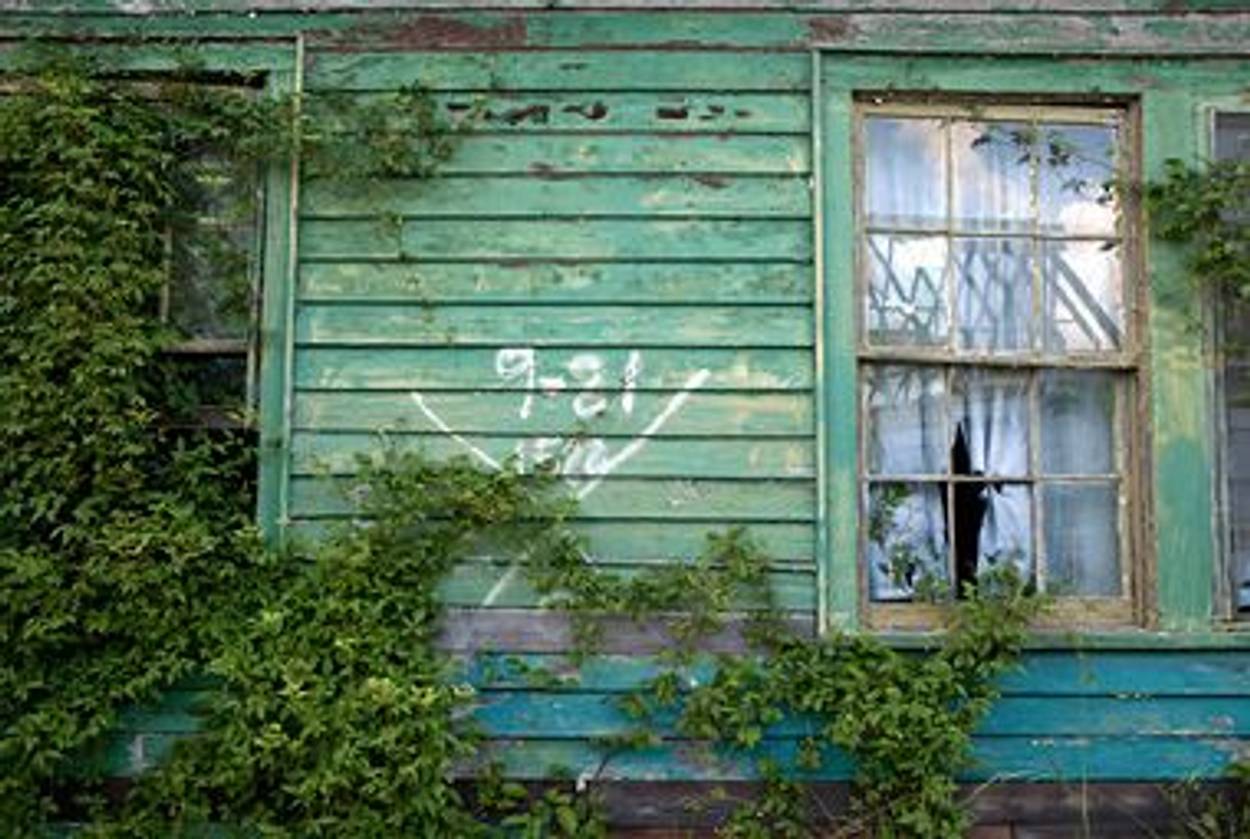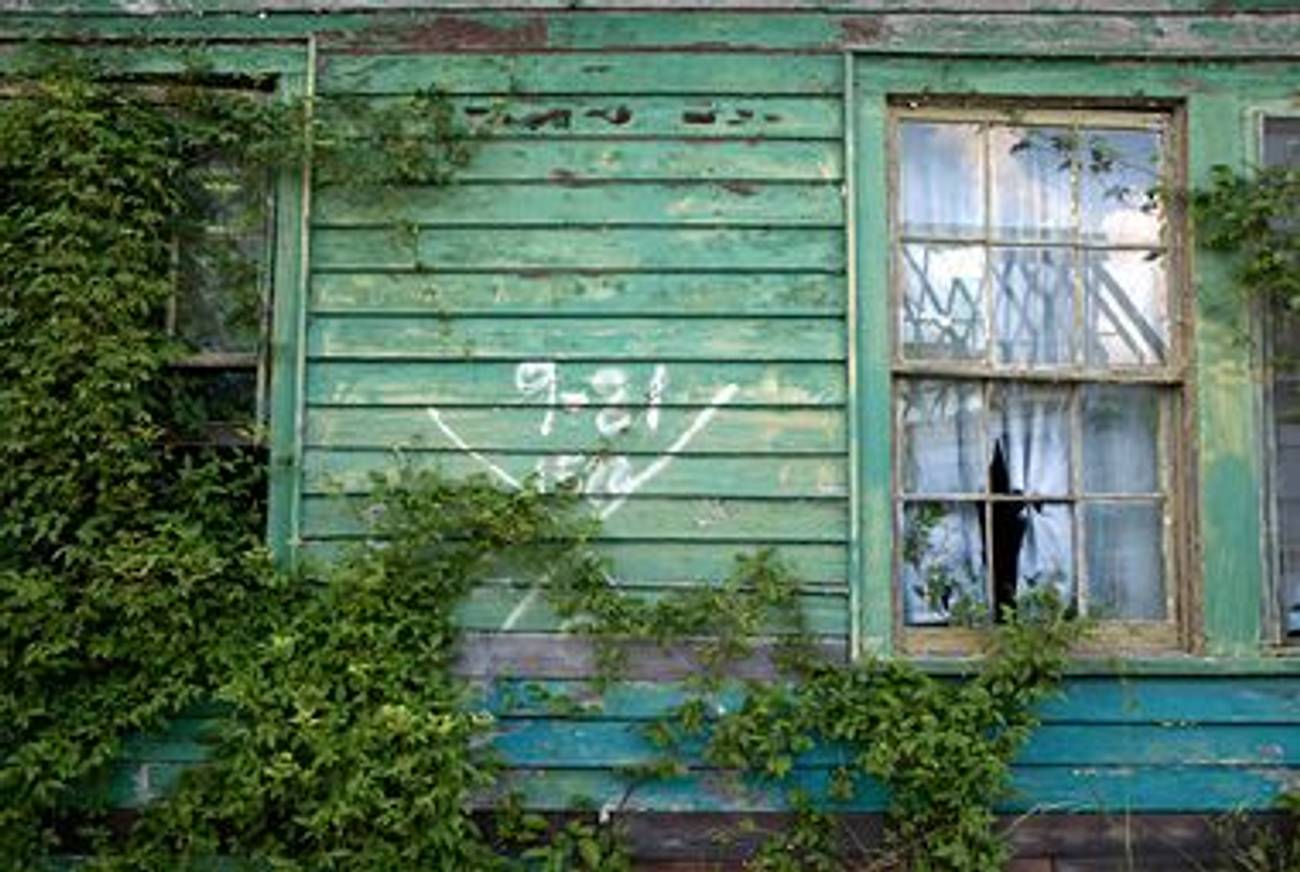After the Exodus
Rosh Hashanah in New Orleans, five years after Hurricane Katrina




Lately in New Orleans, I’ve been dreaming of moving backward in time. It’s a strange sensation: to start at the end and move to the beginning. Time dissolves in dreams, as it does in certain stories.
Jews belong to the oldest book club in the world, and we’ve been dissolving time forever in our old stories, rereading them every week for thousands of years. Why do we do it? Rabbi Nachman, our great tale teller, said stories are meant to heal the soul. And in truth, five years ago, when I thought I was a homeless man, I found soul comfort in Genesis, Exodus, Leviticus, and in stories of the rabbis, too.
My wife and I were traveling up north when Hurricane Katrina struck, and after the shocking failure of the federal levees, we sat in a cheesy hotel room in New York City drinking scotch and watching television coverage of our fragile city flooding. We were desperate for specifics. Was our home underwater?
A week later, my father died in a Florida nursing home. His body was brought home to Baltimore, where he raised me. We sat shiva at my brother’s house. A rabbi walked up to me and said, “You have lost your home.” I said yes, I think so. He said, “God is also homeless. He lost his ‘home’ because his children quarreled.” I knew he meant the story the rabbis tell, how we Jews lost the House of God because of “groundless hatred.”
God is homeless. That was a comfort somehow. Maybe my losses were part of a bigger story than I knew.
But I still hadn’t seen my home.
The TV showed journalists getting past the checkpoints. So my wife and I ginned up a press pass at a copy shop, and got an editor friend to sign it before we returned to New Orleans. Worked like a charm.
Our lawn was full of rack from Lake Pontchartrain. But our house was just high enough off the ground to escape the flood that took the homes of so many of our dear friends. A 130-mile-an-hour wind blew off half the house’s old roof slates. All I could think about was recovering that roof. I felt so exposed. We all did then.
There were only 10,000 people in New Orleans, and no slate roofers. So I found a company in Baton Rouge to help. Twice their truck was turned away at the checkpoints by the National Guard. They wouldn’t try again unless I came and accompanied them at 4 in the morning.
Somehow I persuaded the guard to let us pass. The roofers climbed my roof to apply the magical felt. In the dawn sky, I could see the outline of the new moon, the morning of the Jewish New Year. Three white heron rowed high above us, majestic, pure, and timeless. They were celebrating the birthday of creation—for the New Year is the birthday of the whole world.
Piles of torn branches baked in the hot sun up and down the street, and rough winds blew past our dry wooden houses. Fires broke out all over the city. On the way to the synagogue, we heard a fire alarm that no one was answering and saw smoke from a mansion off of St. Charles Avenue. Later we learned it had burned to the ground.
The Rosh Hashanah service was held in a packed little chapel. We sat in the anteroom on folding chairs. I couldn’t see the rabbi, but I heard the shofar. As I’d heard the soft friction of the heron wings beating, for the city was so quiet that morning, God was whispering.
We were in the first lines of Genesis: light, darkness, and the first winged creatures.
We roamed the empty streets in the days of awe. Amid shuttered shops, an open one sold ice cream—in one, exquisite flavor: “violet.” I spoke to a policeman who had waded through hell; we were all survivors. I spoke to everybody; there were no divides. Post-Katrina we were all like Jews who share a common history of catastrophe. Every conversation started with the same question: How did you make it through the storm?
In time the wild heron gave way to the inhabitants trickling back. Our street ceased to be a flyway, but we still had no mail service for a year. But we had our local newspaper. We felt abandoned, no longer part of the United States. I scanned the Internet by sitting outside shuttered cafes, then one reopened, and we gathered to be human. One morning in March, I read in the paper. A domestic dispute: The first murder. Cain slew Abel. We were moving deeper into Genesis.
And where are we now, five years later? There’s no single story. Many of us are still in Exodus, wandering far from home. Our Pharaoh is the Army Corps of Engineers, indifferent to God or Congress, and two years late on a project to protect the city. We’ve known the plagues of Egypt from coffin flies, to flood and fire, and bad government at every level. Now BP’s oil plagues our waters. Even before that insult, the marsh was dying of saltwater intrusion from countless cuts from oil company canals. The coast that protects New Orleans is drifting into open water—a football field vanishes every half-hour. We have seven years to save it, and nothing urgent being done. Just plans without funding.
We’ve had lots of plans, liked the detailed plans for the tabernacle that fill the last half of Exodus and the first half of Leviticus. We still haven’t built a place where God and man can meet. Our previous mayor promised “cranes in the sky,” but mainly he made plans. Our new mayor just announced 100 projects to be built right away. And I even believe him. Maybe at least we’ve reached the second part of Numbers, where the journey to Canaan resumes.
What story will be told in the end? Will we loiter at the edge like Moses on Mt. Nebo, or will all of us New Orleanians finally make it to the land of our promise?
Personally right now, I feel at home and homeless, feel the joy and the ruin, the loss and the courage, the sorrow of so many victims in exile, the hate and the love.
Some days I tire of all the stories. Then I dream of moving backward in time. They say it’s impossible but I don’t know. God is not homeless in my dreams. After five years in post-Katrina New Orleans, this New Year I want to go back where all the stories begin, look up in the sky, and see three heron fly.
Rodger Kamenetz, founding director of the Jewish studies program at Louisiana State University, is the author of Burnt Books: Rabbi Nachman of Bratslav and Franz Kafka as well as The Jew in the Lotus, The History of Last Night’s Dream, and seven other books of poetry and prose.